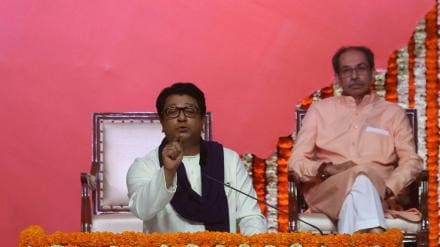Marathi pride has long been a fruitful political plank for the Shiv Sena, whose nativist roots are inseparable from the movement that led to the language-based creation of Maharashtra. Yet, as civic polls return to the state after a hiatus, an ugly political row over language and attacks on Hindi speakers should be nipped in the bud. Nowhere is it more urgent than in Mumbai, where the Shiv Sena’s breakaway group, Maharashtra Navnirman Sena (MNS), has targeted Hindi-speaking people including a share market investor whose office was vandalised. The recent row comes in the wake of a decision of the Bharatiya Janata Party (BJP)-led coalition government in the state to introduce Hindi as a third language in schools.
After a back and forth, the government tactically withdrew the resolution while forming a panel to recommend steps to implement the three-language formula in schools, a contentious issue that has drawn resistance in other states too. The government’s retreat has allowed estranged cousins Uddhav and Raj Thackeray to claim a moral victory as they seek to recover lost political ground with the civic elections later this year. Except briefly in the mid-90s, the undivided Shiv Sena has ruled the Brihanmumbai Municipal Corporation (BMC) in Mumbai since 1985. The BMC’s last term ended in March 2022, after which it has been led by a state government-appointed administrator—a practice that has been in force in other municipal bodies in the state, until the apex court in May ordered the conduct of civic elections within four months.
Language has been and will always remain an emotive issue in a pluralistic country like India. Prior to Maharashtra, Tamil Nadu too objected to the three-language formula. In fact, in response to policy steps or even utterances of the BJP at the Centre and states, justified fears are expressed over the current dispensation’s proclivity to impose order and uniformity that extends to the idea of “one nation, one language”. But that should not be an excuse to reignite linguistic chauvinism or misplaced subnationalist pride that can quickly turn hostile to fellow Indians who are deemed outsiders.
In Mumbai’s chequered history, the Shiv Sena-MNS brand of politics has over time targeted various groups, from South Indians to migrants from Uttar Pradesh and Bihar. In the 2017 BMC election, Shiv Sena had edged out the BJP but its strength was later reduced as the party splintered. The MNS, meanwhile, won only a handful of seats, all of which except one it lost as its corporators jumped ship. Given that and the drubbing in last year’s Assembly polls, there is a need for soul-searching. The state prides itself on being one of India’s biggest engines of growth. That pride can’t be retained with this brand of divisive cynical politics.
Instead of linguistic othering, a better game plan for all parties involved would be offering practical solutions to BMC’s gnawing challenges. Despite boasting financials that are bigger than some small states in India—BMC presented a `74,427-crore budget for FY26—the country’s richest civic body is yet to resolve pressing issues like water scarcity and plug sanitation gaps. Besides, it is dogged with infrastructure hurdles linked to road especially, corruption charges, staff shortage, project delays, and failure to generate revenue. With the resumption of direct representation of citizens later this year, the political parties should focus on fundamental issues concerning all citizens, including the migrant who is an equal partner in Mumbai and Maharashtra’s economy.
